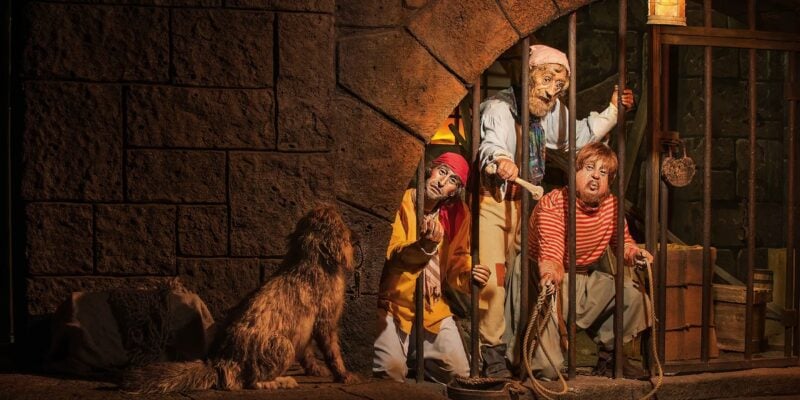Disney has always been quick to adapt when guest behavior forces its hand. From installing protective barriers on rides to adding rules about selfie sticks, the company knows that even one reckless choice can create danger for everyone else.
With unruly guest behavior becoming a bigger problem, Disney is reportedly eyeing a massive transformation to one of its most beloved attractions.
And this isn’t just any ride—it’s a 50-year-old classic that has been a cornerstone of Magic Kingdom since opening day. If the rumors are true, Pirates of the Caribbean could soon look very different.
The idea of adding seatbelts to Pirates may sound surprising. After all, this is one of Disney’s quintessential family rides. It’s not a thrill coaster, not a drop tower, and not even particularly fast. However, with incidents piling up, Disney may have little choice but to take a step no one thought necessary.

What Makes Pirates of the Caribbean So Special
Step inside the fortress-like facade at Magic Kingdom, and you’re transported straight into a world of swashbuckling pirates, sleepy seaside towns, and a little touch of mischief. The slow-moving boat ride is filled with classic scenes: skeletons guarding treasure, pirates singing their now-iconic anthem, and villages set ablaze in chaos.
For many families, Pirates of the Caribbean is a must-do tradition. It’s one of the few rides where grandparents, toddlers, and everyone can sit together. The boats glide gently through darkened caverns, occasionally dipping down small drops that add just enough thrill to earn cheers from younger riders. The appeal isn’t speed—it’s story, atmosphere, and nostalgia.

The Attraction Has Already Changed Before
While the ride has always been beloved, it hasn’t stayed the same. Disney has made adjustments over the decades, some subtle and some major.
In 2006, Captain Jack Sparrow was added to scenes throughout the ride, capitalizing on the success of Pirates of the Caribbean: The Curse of the Black Pearl (2003) and its sequels. That update brought new life to the attraction, bridging the gap between the classic ride and the blockbuster film franchise it inspired.

Other changes were more controversial. A scene once showing pirates chasing women around town was altered to reflect modern sensitivities.
Later, the infamous “wench auction” was removed, with the iconic redhead character transformed into a pirate herself, now overseeing the exchange of goods. These updates sparked debate, but they also showed Disney’s willingness to evolve while preserving the ride’s magic.

The Rise of Guest Misbehavior
But for all Disney’s careful updates, the company now faces a different challenge—guests themselves. Reports of people standing up mid-ride, leaning over the boats, or jumping into the water have become increasingly common. Videos regularly circulate online of riders disrupting attractions, sometimes for a cheap laugh, other times for social media attention.
At Pirates, the temptation is clear. The water is shallow, the boats are low to the surface, and the ride is dark enough that some guests feel bold. Unfortunately, these stunts can cause serious safety risks, from injuries to ride shutdowns. Every time someone bails out of a boat, operations halt, and hundreds of guests are delayed.
Disney has long been patient, relying on cast members, cameras, and security to discourage these antics. But if the behavior doesn’t stop, the company may turn to a more drastic solution: installing seatbelts.

Wait Time Disaster
On the surface, adding seatbelts to Pirates of the Caribbean might sound simple—more safety, less chance of guests misbehaving—problem solved. But the reality is much more complicated.
First, seatbelt checks take time. Think of how long it takes to board rides like Space Mountain or Seven Dwarfs Mine Train. Cast members must walk along rows, tugging on belts to ensure security.
That process could significantly delay the Pirates, where boats are designed to move quickly through the loading station. Longer boarding times mean longer standby lines, and what was once a relatively quick-moving queue could balloon into an extended wait.

Less Family Time
Second, there’s the issue of height requirements. Right now, Pirates is one of the few rides with no restrictions. Parents can hold babies in their laps, letting the entire family ride together. If seatbelts are added, that would likely end.
Disney generally doesn’t allow parents to strap in while holding a child. Instead, each guest must sit in their own seat with restraint. That means toddlers must meet a minimum height requirement to ride, effectively locking out some of the youngest visitors.
It would also shift how families experience the ride. Instead of piling into the same row with a lap child, parents must make tough choices about who rides and who waits. That family-friendly quality—the idea that Pirates was a ride for everyone—could be lost.

A Sad Shift for a Beloved Classic
The thought of seatbelts on Pirates of the Caribbean feels like the end of an era. This isn’t a high-speed coaster; it’s a slow-moving boat ride designed to be accessible to all. However, with guest behavior spiraling, Disney may be forced to make changes no one wanted.
Fans will no doubt debate whether this is the right move. Some will argue that safety comes first and that Disney can’t afford the liability of people jumping out of boats. Others will mourn the loss of a tradition where babies and grandparents could all ride together.

When all is said and done, seatbelts may solve one problem while creating another. They could keep riders locked in their boats and lock out some of the youngest Disney fans. And that would be a sad shift for a ride that, for over 50 years, has welcomed everyone into its world of adventure.
For now, Pirates of the Caribbean sails on as it always has, its cannon blasts echoing and its pirate chorus singing. But the winds of change are blowing, and if Disney follows through, you may buckle in for safety instead of freedom the next time you set sail.
